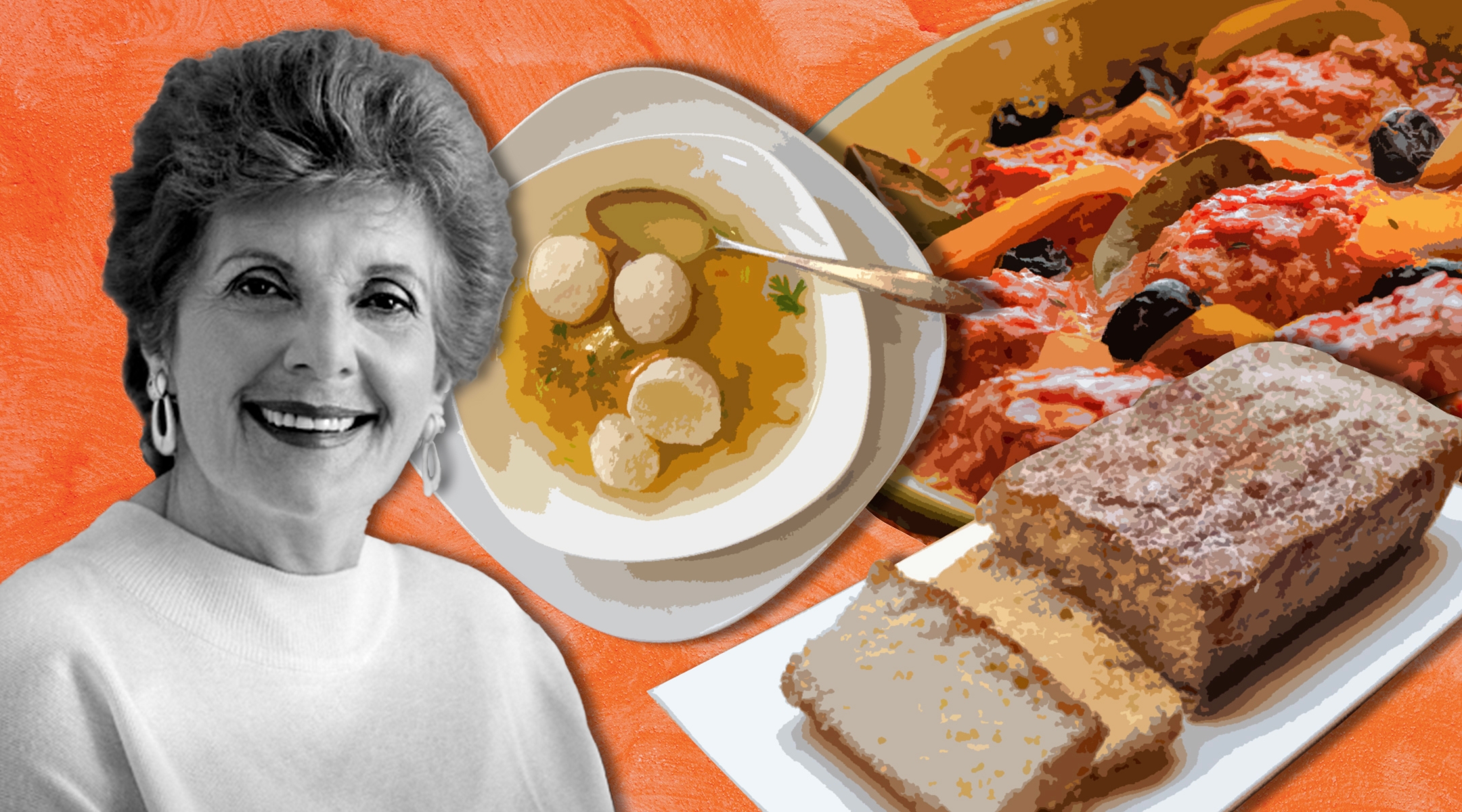Before Yotam Ottolenghi had British Jewry in a sumac-scented chokehold, there was Evelyn Rose. With a weekly column in the Jewish Chronicle (the U.K.’s leading Jewish newspaper) for over 40 years and 14 cookbooks, she was the face and soul of the Anglo Jewish kitchen.
From the 1960s to 2000s, rare was a Shabbat or holiday meal where at least one of Rose’s recipes didn’t feature. In fact, many of my family’s “signature” dishes (my mother’s stuffed cabbage, my grandmother’s lemon drizzle cake) are actually Rose’s, with a couple of small tweaks. Receiving Rose’s tome, “The Complete International Jewish Cookbook” (1976), when leaving home or getting married remains a rite of passage for British Jews. Mine is stained and annotated, just as my aunt, who gave it to me, intended. “Use and enjoy,” she wrote on the inside cover. “I expect to see it, in years to come, scribbled in, spattered and sticky!”
How Rose shaped the culinary habits of British Jews and beyond is a tale of perseverance, passion and a little bit of chutzpah.
Born in 1925 in Manchester, U.K., Rose lived there all her life except for a four-year stint in the U.S., where she was evacuated during World War II. A home economics course at her Seattle high school sparked a passion for cooking, and she studied cooking demonstration techniques at the Manchester College of Housecraft on her return to the U.K.
The Nosher celebrates the traditions and recipes that have brought Jews together for centuries. Donate today to keep The Nosher's stories and recipes accessible to all.
In the 1950s, Rose pitched a Jewish cookery course to BBC, the largest broadcasting corporation in the world, opening the program with a recipe for cheese blintzes. She went on to become the resident cook at Granada Television and cookery editor of Family Doctor Magazine, among other accolades.
Rose began writing for the Jewish Chronicle in the late ‘50s. At the time, Florence Greenberg was well into her fourth decade of writing the weekly cookery column that Rose would take over a couple of years later. Greenberg was influential in her own right: She’d launched the column and was the second British writer to author a Jewish cookbook. And while Rose had already set herself apart from Greenberg by proving there was an appetite for Jewish food in the U.K. outside of Jewish media, this achievement alone was not enough.
To appeal to Jewish readers, Rose branded herself as a contemporary, cosmopolitan Jewish cook. She emphasized healthy eating and portion control, with lighter takes on traditional Ashkenazi dishes, and expanded the boundaries of Jewish food by incorporating dishes from the Diaspora. In the introduction of the second edition of “The Complete International Jewish Cookbook” renamed “The New Complete International Jewish Cookbook” (1992), she writes:
“Whereas the first edition of this book was heavily weighted towards the Ashkenazi kitchen, I have since read widely, consulted, eaten, cooked and now include many dishes from the Sephardi cuisine in all its exciting manifestations. I hope this will give a more balanced picture of Jewish cuisine worldwide.”
From recipes for baba ganoush to ma’amoul cookies to layered kibbeh, Rose was remarkably ahead of the times in her definition of Jewish food and her willingness to play with classic fare. (See: Gefilte Fish Provencal, where classic gefilte fish patties are poached in a tomato sauce with thinly sliced bell peppers and Herbs de Provence.)
Few have made the connection between Rose and Ottolenghi, an Israeli chef who’s established a food empire in the U.K. (and beyond) in the last 20 years, including uber-successful restaurants and cookbooks. Deemed “the Ottolenghi Effect,” he’s transformed the way Britain cooks by championing vegetables and Middle Eastern ingredients. Ottolenghi’s popularity among Anglo Jews today suggests he is Rose’s natural successor, but one only has to flick through “The New Complete International Jewish Cookbook” to see that she introduced her readers to many of the dishes he would become synonymous with.
Rose was able to challenge her readers with unfamiliar recipes and ingredients because they trusted her. She weaved straightforward, quick recipes among lesser-known, modern and elaborate dishes. Most importantly, her recipes were rigorously tested and, I can confirm, stand the test of time.
Rose passed away in 2003 at age 77, but the U.K., who has always loved its culinary leading ladies, will be forever changed by her. “Evelyn has become,” wrote Mandy Ross for the Guardian, “a collective Jewish mother to Jewish mothers everywhere. She is our modern matriarch.”



